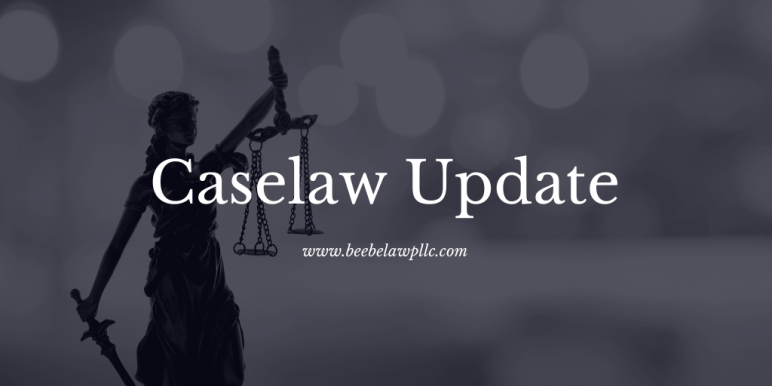This February14th (2023), Valentine’s Day, the NY Federal District Court showed no love for New York’s Hateful Conduct Law when it granted a preliminary injunction to halt it. So this is, to me, an exceptionally fun case because it includes not only the First Amendment (to the United States Constitution) but also Section 230 of the Communications Decency Act, 47 U.S.C. § 230. I’m also intrigued because renowned Eugene Volokh, Locals Technology, Inc., and Rumble Canada, Inc. are the Plaintiffs. If Professor Volokh is involved, it’s likely to be an interesting argument. The information about the case below has been pulled from the Court Opinion and various linked websites.
Plaintiffs: Eugene Volokh, Locals Technology, Inc., and Rumble Canada, Inc.
Defendant: Letitia James, in her official capacity as New York Attorney General
Case No.: 22-cv-10195 (ALC)
The Honorable Andrew L. Carter, Jr. started the opinion with the following powerful quote:
“Speech that demeans on the basis of race, ethnicity, gender, religion, age, disability, or any other similar ground is hateful; but the proudest boast of our free speech jurisprudence is that we protect the freedom to express ‘the thought that we hate.’”
Matal v. Tam, 137 S.Ct. 1744, 1764 (2017)
Before we get into what happened, it’s worth taking a moment to explain who the Plaintiffs in the case are. Eugene Volokh (“Volokh”) is a renowned First Amendment law professor at UCLA. In addition, Volokh is the co-owner and operator of the popular legal blog known as the Volokh Conspiracy. Rumble, operates a website similar to YouTube which allows third-party independent creators to upload and share video content. Rumble sets itself apart from other similar platforms because it has a “free speech purpose” and it’s “mission [is] ‘to protect a free and open internet’ and to ‘create technologies that are immune to cancel culture.” Locals Technology, Inc. (“Locals”) is a subsidiary of Rumble and also operates a website that allows third party-content to be shared among paid, and unpaid, subscribers. Similar to Rumble, Locals also reports having a “pro-fee speech purpose” and a “mission of being ‘committed to fostering a community that is safe, respectful, and dedicated to the free exchange of ideas.” Suffice it to say, the Plaintiffs are no stranger to the First Amendment or Section 230. So how did these parties become Plaintiffs? New York tried to pass a well intentioned, but arguably unconstitutional, law that could very well negatively impact them.
On May 14th last year, 2022, some random racist nut job used Twitch (a social media site) to livestream himself carrying out a mass shooting on shoppers at a grocery store in Buffalo, New York. This disgusting act of violence left 10 people dead and three people wounded. As with most atrocities, and with what I call the “train wreck effect”, this video went viral on various other social media platforms. In response to the atrocity New York’s Governor Kathy Hochul kicked the matter over to the Attorney General’s Office for investigation with an apparent instruction to focus on “the specific online platforms that were used to broadcast and amplify the acts and intentions of the mass shooting” and directed the Attorney General’s Office to “investigate various online platforms for ‘civil or criminal liability for their role in promoting, facilitating, or providing a platform to plan or promote violence.” Apparently the Governor hasn’t heard about Section 230, but I’ll get to that in a minute. After investigation, the Attorney General’s Office released a report, and later a press release, that stated “[o]nline platforms should be held accountable for allowing hateful and dangerous content to spread on their platforms” because an alleged “lack of oversight, transparency, and accountability of these platforms allows hateful and extremist views to proliferate online.” This is where one, having any knowledge about this area of law, should insert the facepalm emoji. If you aren’t familiar with this area of law, this will help explain (a little – we’re trying to keep this from being a dissertation).
Now no reasonable person will disagree that this event was tragic and disgusting. Humans are weird beings and for whatever reason (though I suspect a deep dive into psychology would provide some insight), we cannot look away from a train wreck. We’re drawn to it like a moth to a flame. Just look at any news organization and what is shared. You can’t tell me that’s not filled with “train wreck” information. Don Henley said it best in his lyrics in the 1982 song Dirty Laundry, talking about the news: “she can tell you about the plane crash with a gleam in her eye” … “it’s interesting when people die, give us dirty laundry”. A Google search for the song lyrics will give you full context if you’re not a Don Henley fan … but even 40 plus years later, this is still a truth.
In effort to combat the perceived harms from the atrocity that went viral, New York, on December 3, 2022 enacted The Hateful Conduct Law, entitled “Social media networks; hateful conduct prohibited.” What in the world does that mean? Well, the law applies to “social medial networks” and defined “hateful conduct” as: “[T]he use of a social media network to vilify, humiliate, incite violence against a group or a class of persons on the basis of race, color, religion, ethnicity, national origin, disability, sex, sexual orientation, gender identity or gender expression.” N.Y. Gen. Bus. Law § 394-ccc(1)(a). Okay, but still ..
In explaining The Hateful Conduct Law, and as the Court’s opinion (with citations omitted) explains:
[T]he Hateful Conduct Law requires that social media networks create a complaint mechanism for three types of “conduct”: (1) conduct that vilifies; (2) conduct that humiliates; and (3) conduct that incites violence. This “conduct” falls within the law’s definition if it is aimed at an individual or group based on their “race”, “color”, “religion”, “ethnicity”, “national origin”, “disability”, “sex”, “sexual” orientation”, “gender identity” or “gender expression”.
The Hateful Conduct Law has two main requirements: (1) a mechanism for social media users to file complaints about instances of “hateful conduct” and (2) disclosure of the social media network’s policy for how it will respond to any such complaints. First, the law requires a social media network to “provide and maintain a clear and easily accessible mechanism for individual users to report incidents of hateful conduct.” This mechanism must “be clearly accessible to users of such network and easily accessed from both a social media networks’ application and website. . . .” and must “allow the social media network to provide a direct response to any individual reporting hateful conduct informing them of how the matter is being handled.” N.Y. Gen. Bus. Law § 394-ccc(2).
Second, a social media network must “have a clear and concise policy readily available and accessible on their website and application. . . ” N.Y. Gen. Bus. Law § 394-ccc(3). This policy must “include how such social media network will respond and address the reports of incidents of hateful conduct on their platform.” N.Y. Gen. Bus. Law § 394-ccc(3).
The law also empowers the Attorney General to investigate violations of the law and provides for civil penalties for social media networks which “knowingly fail to comply” with the requirements. N.Y. Gen. Bus. Law § 394-ccc(5).
Naturally this raised a lot of questions. How far reaching is this law? Who and what counts as a “social media network”? What persons or entities would be impacted? Who decides what is “hateful conduct”? Does the government have the authority to try and regulate speech in this way?
Two days before the law was to go into effect, on December 1, 2022, the instant action was commenced by the Plaintiffs alleging both facially, and as-applied, challenges to The Hateful Conduct Law. Plaintiffs argued that the law “violates the First Amendment because it: (1) is a content viewpoint-based regulation of speech; (2) is overbroad; and (3) is void for vagueness. Plaintiffs also alleged that the law is preempted by” Section 230 of the Communications Decency Act.
For the full discussion and analysis on the First Amendment arguments, it’s best to review the full opinion, however, the Court’s opinion opened with the following summary of its position (about the First Amendment as applied to the law):
“With the well-intentioned goal of providing the public with clear policies and mechanisms to facilitate reporting hate speech on social media, the New York State legislature enacted N.Y. Gen. Bus. Law § 394-ccc (“the Hateful Conduct Law” or “the law”). Yet, the First Amendment protects from state regulation speech that may be deemed “hateful” and generally disfavors regulation of speech based on its content unless it is narrowly tailored to serve a compelling governmental interest. The Hateful Conduct Law both compels social media networks to speak about the contours of hate speech and chills the constitutionally protected speech of social media users, without articulating a compelling governmental interest or ensuring that the law is narrowly tailored to that goal.”
With respect to the preemption argument made by Plaintiffs, that is that Section 230 of the Communications Decency Act preempts the law because it imposes liability on websites by treating them as publishers. As the Court outlines (some citations to cases omitted):
The Communications Decency Act provides that “[n]o provider or user of an interactive computer service shall be treated as the publisher or speaker of any information provided by another information content provider.” 47 U.S.C. § 230(c)(1). The Act has an express preemption provision which states that “[n]o cause of action may be brought and no liability may be imposed under any State or local law that is inconsistent with this section.” 47 U.S.C. § 230(e)(3).
As compared to the section of the Opinion regarding the First Amendment, the Court gives very little analysis on the Section 230 preemption claim beyond making the following statements:
“A plain reading of the Hateful Conduct Law shows that Plaintiffs’ argument is without merit. The law imposes liability on social media networks for failing to provide a mechanism for users to complain of “hateful conduct” and for failure to disclose their policy on how they will respond to complaints. N.Y. Gen. Bus. Law § 394-ccc(5). The law does not impose liability on social media networks for failing to respond to an incident of “hateful conduct”, nor does it impose liability on the network for its users own “hateful conduct”. The law does not even require that social media networks remove instances of “hateful conduct” from their websites. Therefore, the Hateful Conduct Law does not impose liability on Plaintiffs as publishers in contravention of the Communications Decency Act.” (emphasis added)
Hold up sparkles. So the Court recognizes the fact that platforms cannot be held liable (in these instances anyway) for third-party content, no matter how ugly that content might be, but yet wants to force (punish in my opinion) a platform by forcing them to spend big money on development to create all these content reporting mechanisms, and set transparency policies, for content that they actually have no legal requirement to remove? How does this law make sense in the first place? What is the point (besides trying to trap them into having a policy that if they don’t follow could give rise to an action for unfair or deceptive advertising)? This doesn’t encourage moderation. In fact, I’d argue that it does the opposite and encourages a website to say “we don’t do anything about speech that someone claims to be harmful because we don’t want liability for failing to do so if we miss something.” In my mind, this is a punishment, based upon third-party content. You don’t need a “reporting mechanism” for content that people aren’t likely to find offensive (like cute cat videos). To this end, I can see why Plaintiffs raised a Section 230 preemption argument … because if you drill it down, the law is still trying to force websites to take an action to deal with undesirable third-party content (and then punish them if they don’t follow whatever their policy is). In my view, it’s an attempt to do an end run around Section 230. The root issue is still undesirable third-party content. Consequently, I’m not sure I agree with the Court’s position here. I don’t think the court drilled down enough to the root of the issue.
Either way, the Court did, as explained in the beginning, grant Plaintiff’s Motion for Preliminary Injunction (based upon the First Amendment arguments) which, at current, prohibits New York from trying to enforce the law.
Citation: Volokh v. James, Case No. 22-cv-10195 (ALC) (S.D.N.Y., Feb. 14, 2023)
DISCLOSURE: This is not mean to be legal advice nor should it be relied upon as such.







